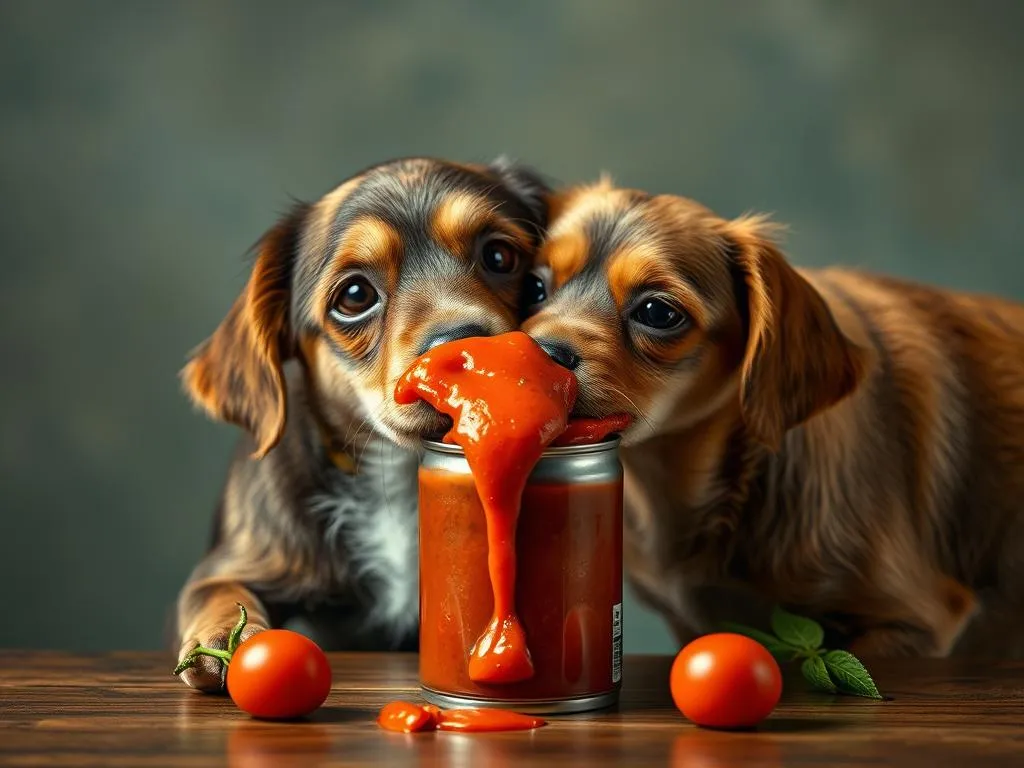
Understanding dog nutrition is essential for any pet owner. Ensuring that our furry friends are fed a balanced diet can significantly impact their overall health and longevity. With so many human foods available, it’s crucial to know which ones are safe for dogs and which can pose risks. One question that often arises among dog owners is: can dogs eat tomato sauce? This article aims to provide science-based insights and guidelines on this topic.
Understanding Dog Nutrition
Basic Nutritional Needs of Dogs
Dogs, like humans, require a balance of essential nutrients to thrive. These nutrients include:
- Proteins: Vital for muscle development and repair.
- Fats: Provide energy and aid in nutrient absorption.
- Carbohydrates: Offer a quick energy source and help with digestive health.
- Vitamins: Essential for various bodily functions, including immune support and skin health.
- Minerals: Important for bone health and metabolic processes.
Each nutrient plays a specific role in a dog’s health, making it crucial to provide a well-rounded diet that includes all of these elements.
Common Foods That Are Safe vs. Unsafe for Dogs
When it comes to feeding dogs, some foods are dog-friendly, while others can be toxic.
Safe foods include:
– Lean meats (chicken, turkey)
– Fish (salmon, sardines)
– Certain fruits (apples, blueberries)
– Vegetables (carrots, green beans)
On the flip side, certain foods can be harmful or even deadly to dogs. Commonly toxic foods include:
– Chocolate
– Grapes and raisins
– Onions and garlic
– Xylitol (found in many sugar-free products)
Tomatoes, particularly their green parts, can also pose risks if not handled properly.
Tomato Sauce: An Overview
What is Tomato Sauce?
Tomato sauce is a popular condiment made primarily from tomatoes. It often includes additional ingredients such as garlic, onions, and spices, depending on the recipe.
Nutritional profile of tomato sauce:
– Vitamins: High in vitamins A, C, and K.
– Antioxidants: Contains lycopene, which may have health benefits for both humans and dogs.
– Calories: Generally low in calories, but can vary depending on added ingredients.
While tomatoes themselves can offer health benefits, the ingredients mixed into commercial sauces can complicate matters.
Health Benefits of Tomatoes for Dogs
Tomatoes are a rich source of several nutrients that can be beneficial for dogs. Here are some of the key nutrients found in tomatoes:
- Vitamin A: Supports vision, skin health, and immune function.
- Vitamin C: An antioxidant that helps reduce inflammation and supports the immune system.
- Vitamin K: Plays a role in blood clotting and bone health.
- Antioxidants: Lycopene is known for its potential cancer-fighting properties.
These benefits may make tomatoes a healthy addition to a dog’s diet when prepared correctly.
Can Dogs Eat Tomato Sauce?
The Risks of Tomato Sauce for Dogs
While tomatoes can be beneficial, tomato sauce can pose several risks for dogs.
- Toxicity of Raw and Unripe Tomatoes: Raw tomatoes and their green parts contain solanine, which can be toxic in large quantities. Unripe tomatoes are particularly high in solanine.
- Harmful Ingredients: Many commercial tomato sauces contain ingredients that are not safe for dogs, such as garlic and onion, which can lead to gastrointestinal issues and more severe health problems.
It’s essential to scrutinize any tomato sauce before considering it for your dog.
Safe Consumption Guidelines
If you’re considering giving your dog tomato sauce, it’s crucial to ensure it is safe. Here are some guidelines:
- Homemade Variety: Making your own tomato sauce allows you to control ingredients and avoid harmful substances.
- Serving Size: If you decide to introduce tomato sauce, start with a small amount to see how your dog reacts. A teaspoon for small dogs and a tablespoon for larger dogs is a good starting point.
- Frequency: Tomato sauce should not be a regular part of your dog’s diet. Treat it as an occasional addition.
Alternatives to Tomato Sauce for Dogs
Safe Homemade Tomato Sauce
Creating a dog-friendly tomato sauce at home is straightforward and allows you to ensure your pet’s safety. Here’s a simple recipe:
Ingredients:
– 2 ripe tomatoes (peeled and chopped)
– 1 small carrot (finely grated)
– 1 tablespoon of olive oil (optional)
– A pinch of oregano (optional)
Instructions:
1. In a saucepan, combine the chopped tomatoes and grated carrot.
2. Cook over low heat for about 15-20 minutes until the tomatoes break down.
3. Allow the mixture to cool, then blend it to a smooth consistency.
4. Add olive oil and oregano if desired.
5. Serve in small amounts to your dog.
Ingredients to Avoid: Never include garlic, onions, or excessive salt in your homemade sauce.
Other Healthy Treats for Dogs
If you’re looking for alternatives to tomato sauce, consider these healthy treats:
- Carrot sticks: Great for dental health and low in calories.
- Pumpkin puree: Beneficial for digestion and very nutritious.
- Peanut butter: Ensure it does not contain xylitol, which is toxic to dogs.
These options can provide variety in your dog’s diet without the risks associated with tomato sauce.
Signs of Adverse Reactions
Common Symptoms of Food Intolerance in Dogs
When introducing any new food, it’s essential to monitor for adverse reactions. Common symptoms include:
- Digestive Issues: Vomiting or diarrhea may indicate that your dog is intolerant to a new food.
- Allergic Reactions: Symptoms can include itching, swelling, and hives.
If you notice any of these signs after introducing tomato sauce or any other new food, it’s vital to remove it from their diet.
When to Consult a Veterinarian
If your dog experiences severe symptoms or if you’re concerned about their reaction to new foods, consult your veterinarian. It’s always better to err on the side of caution, especially when it comes to your pet’s health.
Conclusion
In summary, while dogs can eat tomato sauce, it’s essential to consider the risks involved, particularly with commercial varieties that may contain harmful ingredients. Homemade sauce can be a safer alternative, but it should be given in moderation. Always watch for signs of food intolerance, and consult your veterinarian for personalized nutrition advice.
When it comes to your dog’s diet, being informed is key. Make sure to prioritize their health by understanding what foods are safe and beneficial for them.
FAQs
Can dogs eat cooked tomatoes?
Yes, dogs can eat cooked tomatoes in moderation, provided they are ripe and cooked without harmful ingredients like garlic or onions.
What if my dog accidentally ate tomato sauce?
Monitor your dog for any signs of adverse reactions, such as vomiting or diarrhea. If they exhibit severe symptoms, contact your veterinarian.
Are there any health benefits of feeding my dog tomatoes?
Yes, tomatoes can provide vitamins A, C, and K, along with antioxidants when prepared safely.
How can I tell if my dog is having a bad reaction to a new food?
Watch for symptoms like vomiting, diarrhea, itching, or swelling. If these occur, discontinue the food and consult your veterinarian.









